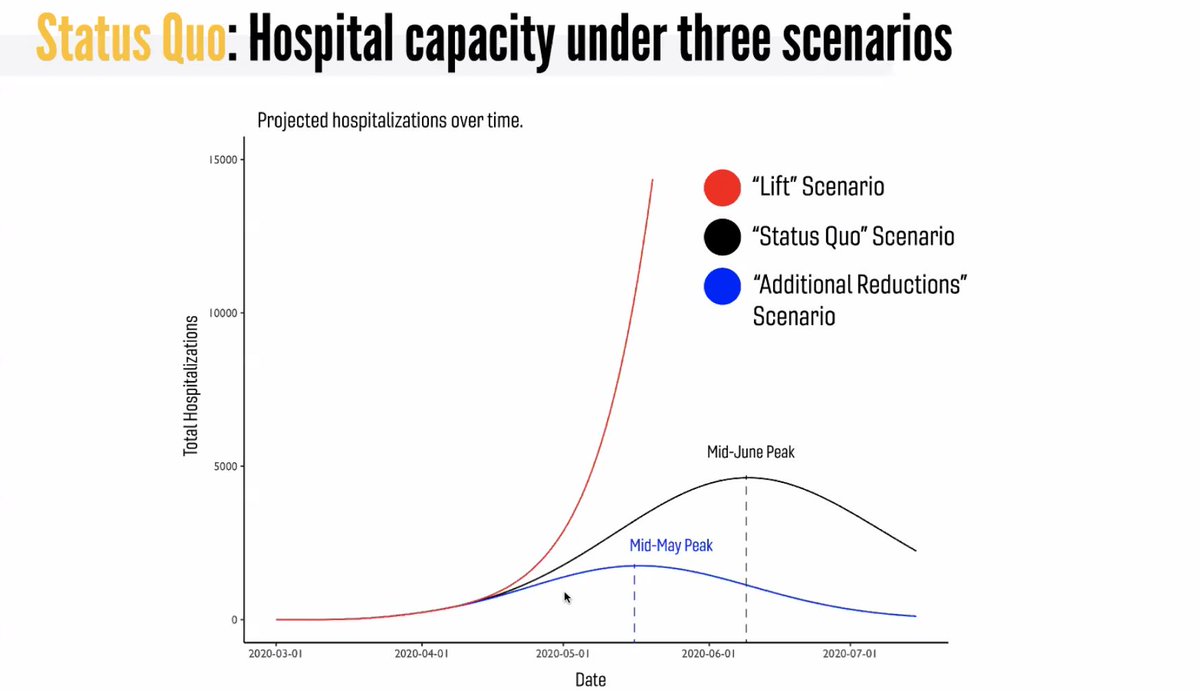In the past month, Tennessee has made incredible gains in the campaign against coronavirus. But we have so much to lose. This is a short thread about how it could all go wrong. https://www.tennessean.com/story/news/health/2020/04/10/vanderbilt-coronavirus-modeling-social-distancing-hospitalization-estimates/5127909002/">https://www.tennessean.com/story/new...
Today, I spent about an hour listening to health policy researchers at Vanderbilt University ( @VUHealthPol). They’ve been quietly modeling the coronavirus in our state for a few weeks. I was anxious to see what they knew. There is a lot to unpack here. Here we go.
First, social distancing is working. In mid-March, an infected Tennessean was believed to spread the virus to 5 people. At that rate, the virus grows uncontrollably exponentially. Then we started the hard stuff. Staying home. Closing businesses. Missing our friends & families.
None of these changes have been easy. Many of the things we love – sports, concerts, culture – have vanished. The economy tanked. So many people have lost their jobs or suffered pay cuts or furloughs. (Me too.) But these sacrifices are working.
Per Vanderbilt, while an infected Tennessean once spread the virus to 5 people, they now only spread it to 1.4 people. If we can get that number below 1 for a significant amount of time, the outbreak will be suppressed. It will starve.
Will that happen in Tennessee? It is hard to say. Vanderbilt has predicted three scenarios for the future of the state. I’ll explain them one by one.
First, there is the “status quo” scenario: If we maintain social distancing as it is now & the transmission rate stays above 1, the virus will peak in June. 5,000 people will be hospitalized at one time. Our hospitals will be stretched but not shattered. https://www.tennessean.com/story/news/health/2020/04/09/vanderbilt-coronavirus-modeling-5-000-people-hospitalize-peak-in-june/5119845002/">https://www.tennessean.com/story/new...
If we do better, and get that transmission rate below one, the virus peaks in mid-May. Less than 3,000 people hospitalized. Our hospitals can handle that. Vanderbilt calls this scenario “optimistic.”
(They didn& #39;t say how exactly we do this. No policy advocacy from this group.)
(They didn& #39;t say how exactly we do this. No policy advocacy from this group.)
And then, there is a scenario where this all falls apart. If we were to abandon social distancing right now, then the virus peaks in May with 50,000 hospitalizations. I don& #39;t think I need to tell you we don& #39;t have 50K hospital beds to spare. The results would be catastrophic.
Now, there is no reason to think we are going to abandon all social distancing. For example, even if some public officials stopped stay-at-home orders, it seems completely unrealistic that they ALL would do it. So this an extreme scenario. But it illustrates all we have to lose.
One of the Vanderbilt researchers I spoke with said they believe the Tennessee outbreak was started by about 10 infected patients. A similarly small number could inflame the outbreak now, like embers igniting a wildfire.
In summation, the big brains at Vanderbilt say we are pulling this off, but our progress is incredibly fragile. If even a few of us get too cocky, lazy or foolhardy to stay the course, the ramifications could be big and deadly.
Let& #39;s not.
Let& #39;s not.

 Read on Twitter
Read on Twitter


